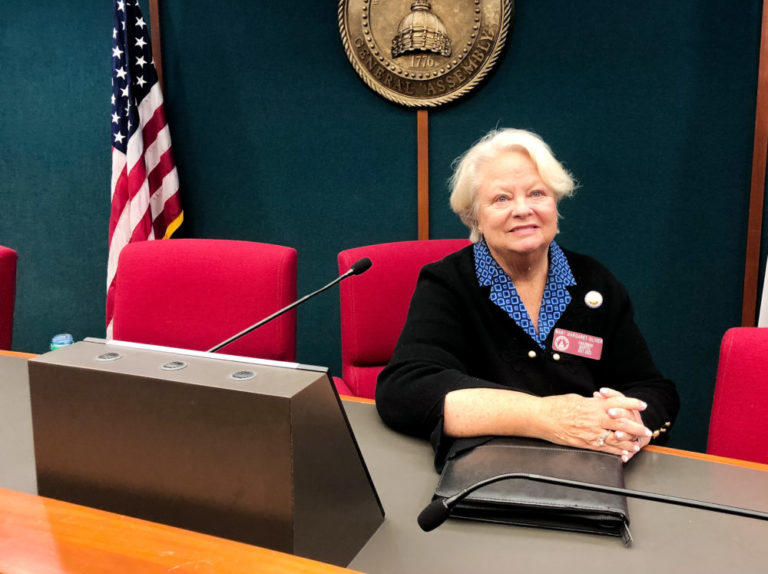
Caption
Rep. Mary Margaret Oliver, a Democrat from Decatur, chairs the MARTOC committee as the only Democratic chair in the majority Republican state House of Representatives.
Credit: Taylor Reimann/Fresh Take Georgia
|Updated: December 9, 2021 9:04 AM

Rep. Mary Margaret Oliver, a Democrat from Decatur, chairs the MARTOC committee as the only Democratic chair in the majority Republican state House of Representatives.
Georgia state Rep. Mary Margaret Oliver, a longtime Democratic lawmaker, surprised a lot of people when she applied for a committee chair position in the GOP-controlled House earlier this year.
But it was Oliver’s turn to be surprised when the speaker appointed her to chair the joint committee with the Senate overseeing the Metropolitan Atlanta Rapid Transit Authority’s budget.
“I didn’t think I really had a shot, but I did have a shot,” said Oliver, who has represented Decatur off and on since 1987. “When do you take your opportunity? When do you really push for it?”
All House committee chairs have been Republicans since the GOP won control of the General Assembly in 2005, but House Speaker David Ralston said he chose Oliver because “she has earned the trust of colleagues in both political parties.”
Her appointment was the latest leadership position for a politician who has served more than 30 years in the Legislature, making her the second-longest-serving female lawmaker. There were 26 women in the General Assembly when she arrived. Now there are 80 out of 236 or 33.9%, making Georgia 18th in the country for the highest percentage of female legislators.
Oliver received her law degree from Emory University in 1972 and, early in her career, practiced law in rural north Georgia with the Georgia Legal Services Program, an organization that seeks to provide legal aid to those who cannot afford it and who often live in rural areas without access to lawyers.
She said in a 2009 interview with Bob Short, for a Georgia Politics oral history project at the University of Georgia, that her work with the Georgia Legal Services Program first exposed her to advocacy and politics. In fact, she was a lobbyist with that organization when she first set foot in the Georgia Capitol.
“I was amazed. I’d never been in the Capitol before I was about 30 years old,” Oliver said in a recent interview. “Being a practicing lawyer gave me a huge access to the members who were serving.”
Later, she entered private practice with Pierre Howard who, at the time, was a state senator and later became Georgia’s lieutenant governor from 1991 to 1999. When her House district’s representative suddenly passed away, she took the opportunity to run a campaign and won a special election in the summer of 1987.
Oliver said she believes her 15 years of law experience prior to her election to the House gave her an edge.
“I think because I was the only woman lawyer, I got extra opportunities in the beginning, and then I had to perform,” she said.
After serving as a representative from 1987 to 1992, Oliver was elected to the Georgia Senate, where Howard appointed her to chair the Judiciary Committee in her freshman term, which was unheard of for a female lawmaker.
She said chairing the Judiciary Committee gave her “a very good opportunity to pass legislation I personally care about,” including Georgia’s anti-stalking law, which defined and criminalized stalking behaviors. Oliver said that at the time, stalking was becoming more prevalent as other states created laws criminalizing it, and as a lawyer with previous experience in stalking cases, she was well-positioned to research and author it.
Oliver left the Senate in 1998 to launch a campaign for lieutenant governor. To date, Georgia has only elected six women to state executive positions, and at that time, there had only been one. While she led in the Democratic primary, she was defeated in a primary runoff, and Georgia has yet to elect a female lieutenant governor.
“In a very tough loss, I never once regretted making the effort,” she said with a smile. “I’m really pleased that I never regretted taking my shot.”
After a few years out of office, Oliver was reelected to the House in 2003. Her work since has been focused on children and families, and she authored laws addressing the foster system, domestic violence and child abuse.
In her personal life, Oliver teaches Sunday school at All Saints’ Episcopal Church in Atlanta and still lives in Decatur, Georgia, the city where she grew up.
Oliver’s longtime friend Melita Easters, the executive director of a political group that backs Democratic female candidates in Georgia, said she is always one of the smartest people in the room and is a natural leader with a big heart.
“I think she has a very collaborative leadership style,” Easters said. “She knows what it takes to get something done, and she works with others to make it happen. She doesn’t have to have the spotlight.”
Politically, Easters said she believes both Republicans and Democrats respect Oliver because of her knowledge of the law and her seniority in the General Assembly.
“I mean, she wouldn’t be the chair of the MARTOC Committee, and as the lone Democratic chair in the House, if the Republicans didn’t respect her,” Easters added.
Rep. Shaw Blackmon, a Republican from Bonaire, serves on the Metropolitan Atlanta Rapid Transit Overview Committee under Oliver and agrees that she is well-respected by many lawmakers.
“She is a dear friend of mine and a great legislator, even though we don’t necessarily agree on issues all the time,” Blackmon said.
Oliver said she believes her appointment to the MARTOC committee was a move toward bipartisanship.
“I applaud him for it,” she said of Ralston. “The Senate has always had chairmen of committees that were in the minority party, but the House never had.”
This story comes to GPB through a reporting partnership with Fresh Take Georgia.